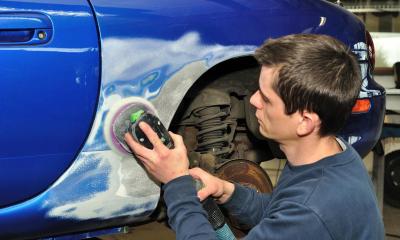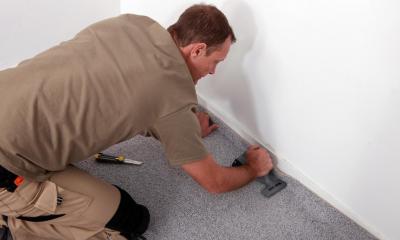
Car bodyshops provide a range of services to vehicle owners, such as repairing accident damage, respraying an entire vehicle, and fitting modifications. Our easy-to-follow guide will help you to start up and run your own bodyshop.
- What competition will your car bodyshop face?
- Why will people choose your car bodyshop?
- Establish your customer profiles
- Decide which car repair services to offer
- Promote your car bodyshop
- Insurance company approval schemes
- Price your car bodyshop services
- Buy an existing car bodyshop
- SMART franchises
What competition will your car bodyshop face?
Estimating demand
You'll want to make sure there is enough demand in your area for your proposed car bodyshop. The sector is very competitive and body repair services are available from various sources including:
- other independent businesses (ranging from sole traders with no employees working from a small lock-up to businesses located in large industrial units)
- insurance company owned workshops
- mobile SMART repair (small to medium area repair techniques) businesses, including those that are part of a franchise network such as ChipsAway
- franchised motor dealers (main dealers)
- secondhand car dealers
- breakers yards offering panel and glass replacement services
Check out the competition in your area to identify how many other outlets are already providing car body repairs locally.
It may be that you'll only be competing directly against some of these outlets because you'll be targeting a particular area of the market or offering specialist services which are hard to find elsewhere. Look at the services offered by existing businesses in your area to establish:
- whether they specialise in any way (for example classic car restoration work)
- if they offer paint spraying services
- whether they replace glass, lights, bumpers and so on
- if they are part of a quality standards scheme
- what other related services they offer (for example upholstery repairs, convertible roof replacement)
- whether they provide a vehicle recovery service
- whether they offer customers a courtesy car
- what they charge
- what are their opening hours
- what type of customers do they attract
- how knowledgeable, well qualified and helpful their staff are
- whether the premises and fittings are modern and smart
Find out if there is a gap in the market that your business can fill.
Find out what people want
As you are likely to face strong competition, it is important to find out what people want and whether you can offer any particular services to attract customers. If you plan to carry out a local survey, don't forget that your customers might include other businesses such as vehicle hire businesses, taxi firms, driving schools and used car dealers.
Research current trends, plus legal and tax issues
Why will people choose your car bodyshop?
You will want to make sure that enough people will choose your business rather than taking their vehicle elsewhere.
Many of your jobs are likely to be repairs to accident-damaged vehicles. These repairs are often paid for by insurance companies, who generally steer customers towards one of their approved repairers. However, in some cases drivers may choose to pay for minor repairs themselves rather than lose a valuable no-claims discount. Other work will not be accident-related at all - for example, repairs to corroded panels on an MOT failure or on a vehicle that's being prepared for sale, or classic car restoration work. In addition, you might get work from drivers wishing to alter the appearance of their car by adding a body-kit, rear spoiler, different lights or specialist paintwork. Modifying cars is currently popular and many drivers spend large amounts improving the performance and changing the appearance of their vehicles.
Many customers will make their choice of which bodyshop to use based on price, so make sure that your prices are broadly competitive with other local repairers. However, price is not everything, and potential customers will also consider factors such as your reputation, training, the level of service you offer, convenience and reliability.
You could consider joining an insurance company approval scheme, which should lead to a steady supply of work. Alternatively, your market research may have revealed a gap in the market that you can fill. For example, perhaps no one in your area specialises in restoration work on older vehicles.
Whether or not you decide to specialise in a particular type of work, emphasise the quality of your services. Joining a trade association quality scheme will demonstrate that your business is run to a high standard. Similarly, a friendly and knowledgeable approach will inspire confidence in potential customers. People working in independent repair businesses often have a keen interest in cars and are happy to discuss matters with customers and to offer advice. An in-depth knowledge of cars, repair techniques, modifications and so on is a great strength. This kind of expertise and personal service is not widely available, so make the most of these strengths and make sure that your customers are aware of what you can offer.
Establish your customer profiles
Your market
If you are a member of an insurance company approved repairer scheme, this is likely to be your main (or even only) source of work, although some accident repair work may also come directly from vehicle owners. Other customers will be drivers of older vehicles needing structural repairs to pass the MOT test or owners of vehicles that need attention before they are sold. Specialists offering services such as classic vehicle restoration work or convertible hood replacement may find that this becomes their main source of income.
As well as private motorists, you may get work from driving schools, taxi and minicab firms, vehicle hire businesses and motor dealers. Organisations such as universities, colleges, hospitals and local authorities often run their own fleet of vehicles and might also be worth approaching.
Special offers and discounts
You may decide to offer a standard discount as a matter of course to any regular trade customers. How much discount will depend on your pricing policy and the level of local competition.
Many businesses also give discounts to employees, regular customers, family and friends. A reduced rate could be offered to groups such as pensioners or members of a classic car club. Check out the local opposition for ideas and keep a close eye on any special offers you make to ensure they are working for you. After all, these kinds of promotions might encourage extra business, but they will also affect the amount of profit you make on each job.
Decide which car repair services to offer
What range of work will you do
Most bodyshops tend to specialise in accident repairs, as these are by far the largest source of work. Work might range from small repairs such as knocking out a dented wing or respraying a scratched door panel, to large rebuilding jobs involving the use of hydraulic jigs to straighten the body shell of a crashed car. Some businesses carry out MOT work that often involves repairing corroded areas on older vehicles. Others specialise in providing paint spraying services or concentrate on restoring classic cars. Many bodyshops will offer a range of these services and may even carry out some mechanical work such as steering and suspension repairs.
Specialist services
Your market research might have revealed a gap in the market that you can fill by offering a specialist service. Before deciding to specialise, however, think about the location of your business and its potential customer base - in some places (rural areas, for example, where the population density is low), you may need to offer a wide range of services in order to get enough work.
In many cases though, specialising can be a good way to distinguish your business from your competitors and help you to compete effectively. For example, perhaps no one in your area is a specialist in classic car restorations. This is complicated work requiring specialist skills for which training may be necessary and as a result, not many bodyshops are willing to take on work of this type. There are drawbacks - restoration work is often a long-term job, and disputes over the final bill can be quite common. Nevertheless, enthusiasm for classic cars of all varieties remains high in the UK and restoration services are in demand. In fact, many restoration workshops have a waiting list of customers' cars lined up for work.
The modified car scene is also very popular and you could consider offering to fit body-kits, spoilers and other modifications. Specialised paint jobs are also popular. Some drivers are prepared to spend large amounts of money modifying the appearance of their car. Tapping into this trend could provide a valuable source of extra income.
Another specialist service you could try offering is repairing or replacing convertible roofs. The 1990s saw a large volume of sales of convertible cars with fabric hoods (for example, the Mazda MX-5), rather than folding metal roofs as is more standard on most modern convertibles. Many of these are at the age when the hood requires replacing. Again, this is a service that not many independent bodyshops provide and so could be a good source of extra work.
Additional services
As well as car body repairs, you could consider offering additional services such as:
- fitting tow bars
- car valeting
- 'SMART repairs' (small to medium area repair techniques) to paintwork, windscreen cracks, and so on
- upholstery and interior trim repairs
- providing an accident recovery service (this might bring in extra work but would require a suitably equipped vehicle)
- providing a courtesy car for customers to use while their car is being repaired - although you won't earn any money for this service, it may be a reason for new customers to choose your business and to keep using you in the future. (Bear in mind that if you carry out work for insurance companies, they may require you to provide - and pay for - a courtesy car for their policyholders)
Promote your car bodyshop
The right image
People's first impression of your business is often influenced by the way it looks - so it is vital to project the right image. Keep your premises clean and tidy and if necessary, consider repainting to brighten things up. If possible, have a separate reception/waiting area, where you can talk to customers and they can sit while they wait to collect their car without having to suffer the discomfort of breathing in paint fumes. You might consider installing a drinks machine or implementing free Wif-Fi.
If you operate a recovery service, bear in mind that the tow truck will be a highly visible advertisement for your business. It doesn't need to be new, but keep it looking smart and well maintained. Make sure your logo and livery are clearly shown on it.
Good service
Even more important than appearance is the attitude shown to customers. Too often, people associate garages with poor service and a somewhat off-hand or patronising manner. Treating customers in a friendly, helpful and polite way will help to create a good impression. Reputation can only be built over time, but from the outset you should aim to offer a high level of service and ensure customers are satisfied with the work done.
Deal with any questions or complaints promptly and politely. Take care when making estimates and always contact customers before starting work not originally budgeted for.
Quality standards
High standards are essential to attract and retain customers. Insurance companies operate their own approval schemes, and various trade associations have quality assurance schemes that set strict standards for their members. Schemes include:
- BSi Kitemark
- The National Body Repair Association (NBRA) Code of Practice
- IMI Accreditation
You may be required to undergo training and your premises may have to reach set standards before the business earns the right to display the NBRA sign or become an IMI accredited technician. The effort is worth it - such status will demonstrate to potential customers the high level of service on offer. It will also help to raise the profile of your business - the IMI and the NBRA operate online directories, which enable potential customers to search for member businesses in their area. You can find out more on their websites.
You might also think about becoming approved by the FOXY Lady Drivers Club which operates subscription-based networks of 'female friendly' garages and accident repair centres. You can find out more on the FOXY Choice website.
Advertising your car bodyshop
It is important that you advertise your business so that potential customers know about you and the services you offer. There are a number of things you can do to promote your business:
- use external signs to inform and attract passing trade
- advertise in your local newspaper and any local directories (emphasise any unusual services offered or features that distinguish your business from the competition)
- advertise in classic car magazines if you offer restoration services
- launch your own website to reach a wider market - particularly if you offer specialist services not easily found elsewhere
- contact local driving schools and taxi firms to let them know about your services and pricing structure
Once your business has become established, you are likely to find that you have a large amount of repeat custom and many new customers will come from word-of-mouth recommendation.
Insurance company approval schemes
Most insurance companies have a network of approved repairers that they steer their policyholders towards. The insurance company will usually want to see an estimate of the cost of repairs before they will agree to pay for the job to be done by a repairer outside of this network. Many people let the insurance company make arrangements simply because this is the easiest option - the damaged car is often collected and a courtesy car provided for the customer to use.
If you join an insurance company's approved repairer scheme, you are likely to be guaranteed a steady stream of accident repair work. The drawback is that the rate of pay offered by the insurance company may be low and assessors will try to keep costs down wherever possible. As a result, the profits on this type of work can be small.
Contact the insurance companies directly for information about joining their approved repairer schemes.
Some insurance companies have been accused of anti-competitive behaviour to the detriment of small body repair businesses. According to the National Body Repair Association (NBRA) the aggressive practices include:
- requiring that work must be carried out at a workshop chosen by the insurance company rather than by the customer
- setting labour rates and times
- requiring the repairer to provide parts, paint and materials for free or at a discount
- specifying that certain suppliers must be used
- insisting that particular computerised estimating systems, equipment and machinery are used
Price your car bodyshop services
When considering your pricing policy, remember that you must be able to cover your costs, overheads and drawings.
How you set out your prices
Repairs to accident-damaged cars will usually be paid for by an insurance company. Unless you are part of that company's approved repairer scheme, an assessor will be sent to check that the appropriate work is being done and that the insurance company is not being overcharged.
Bills for car repair work are usually itemised, with the cost of replacement panels, paint and so on listed together with a separate charge for labour.
Parts
The charge made to a customer for parts is usually the cost price of the parts increased by a certain amount. (Many businesses add 15% or 20%.)
Labour
The labour charge depends on how long it takes you to do the job and the set rate charged per hour. Hourly rates vary considerably - you could check out the local competition to find out the rates typically charged in your area. Work obtained through membership of an insurance company approved repairer scheme is usually paid for at an hourly rate set by the insurance company using manufacturers' times.
With other work, it is up to you to decide what to charge. For simple jobs, you may decide on a set fee - for example, a fixed price for replacing a windscreen, respraying a bonnet or wing or rectifying a certain number of small areas of corrosion or light accident damage.
For most repairs it will usually be necessary to assess each job as it comes in, and agree a price with the customer beforehand. This is likely to be the only practical approach when carrying out accident repairs. Experience is necessary to estimate the extent of the work required and set a fair price. Make it clear to your customers that the prices you quote are estimates, which could increase to a certain extent if problems arise. Even so, be sure to get the customer's consent before you embark on any additional work not originally budgeted for.
Be particularly careful if you undertake restoration work on classic cars. Disputes often arise because the amount of work required (and hence the cost) is difficult to judge until a car is completely dismantled. A reasonable looking vehicle may turn out to be a can of worms, with extensive corrosion hiding beneath a sound looking exterior. Take care when making estimates and avoid misunderstandings by keeping customers regularly updated on how the restoration is progressing. In cases like these, it's a good idea to always check with the customer before embarking on potentially costly work that wasn't detailed in the original estimate.
Other services
Consider how you will cost any other services you provide (for example, if you offer breakdown recovery or courtesy car hire), how often you will review your prices and whether you will offer discounts, such as reduced rates to trade customers, or special offers.
Buy an existing car bodyshop
You might decide to buy an existing car bodyshop, rather than start your own venture from scratch. Buying a going concern can mean that the products, customers, regular sales, staff, premises and workshop equipment are already in place.
But buying a business can be a hazardous, expensive process unless you have the right skills and experience on your team, including legal and financial know-how. Establish the genuine trading and financial position, so that the price you pay for the business is not too high.
Franchises
Buying a franchise can be a good 'halfway house' between starting out from scratch and buying an existing business. For example, see below.
SMART franchises
SMART repairs (small to medium area repair techniques) are a relatively recent major innovation in the car body repair industry. SMART techniques enable minor damage such as chipped and scratched paintwork, bumper scuffs, small windscreen cracks and so on to be repaired quickly and cheaply without the need for replacement parts. SMART repairers often work as a mobile service, using portable equipment to carry out the repairs. You will need specialist tools, materials and training if you decide to offer SMART repairs.
When starting up a mobile SMART repairs service, you may decide that you would benefit from being associated with an established business. This is made possible by franchising. If you purchase a franchise you'll still be setting up your own business, but you should benefit from the experience, resources and perhaps the name of a business that is already successful.
There are many SMART repair franchise opportunities available from large national schemes in the UK - for example, ChipsAway. An online search for "SMART repair franchises", for example, should turn up a range of different franchise opportunities. Although different schemes vary in detail, most feature the following key points:
- as a franchise holder, you'll remain self-employed but will use the identity (corporate colours, logos, trade name and so on) of the franchisor
- in return, you'll pay the franchisor a fee - this might be a one-off investment, a monthly charge, or a combination of both
- both you and your franchisor will have to fulfil certain obligations - the franchisor might, for example, allocate you an exclusive protected territory, while you might agree to use particular brands of SMART repair consumables such as spray paints
Many franchisors will provide you any specialist training you require, as well as advice and support on a range of business and technical matters.
Details of the above points are set out in the franchise agreement or contract, which both you and your franchisor will sign. The agreement will also deal with other matters, for example the minimum period for which the franchise will run.
The franchise info and British Franchise Association websites have further guidance to help you decide whether franchising is the right option for you.
Before entering into a franchise agreement, it is advisable to compare the terms of different franchisors available to be sure that you're getting a good deal. Go through the contract with your solicitor before signing anything. More information on franchising is available from the Franchiseinfo website.
There is also helpful information on SMART repairs in the ABP Club's 'UK Body Repair Industry Guides'.



